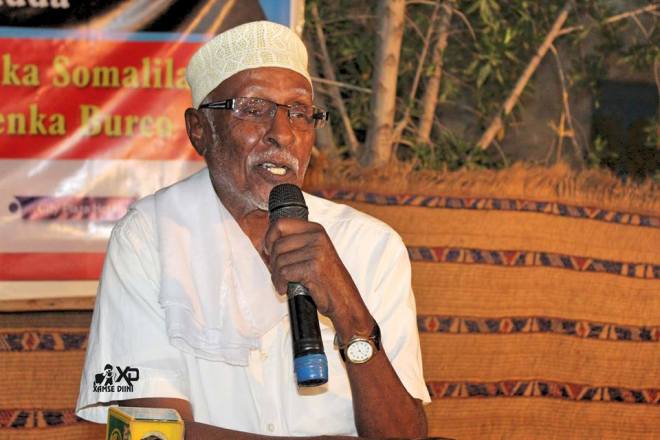
Thursday, January 14, 2016

advertisements
Legend has it that in early 1970s, renowned Somali female singer Magool gave a concert in Khartoum, Sudan. Magool returned home leaving behind an enchanted man: a Sudanese man had fallen in love with the Somali nightingale! But she was gone.The man decided to write her a love letter which he then posted. Unable to read this letter because it was written in Arabic, Magool sought the help of Hadraawi, the celebrated Somali poet, who spoke the language. The letter was presumably written in red ink, but as Hadraawi read it he discovered that the love-stricken man had used blood drawn from his veins which he had put into a fountain pen and poured his heart out! Hadraawi, the great poet that he is, had his imagination soaring.
To come to terms with what he’d just encountered, Hadraawi wrote the famous poem, Has Love Ever Been Written in Blood.
Hadraawi’s greatness as a poet lies with his vision of reality, his masterful use of language, his stunning imagery and metaphor, his remarkable deployment of juxtapose, his affirmation that poetry has an element of absolute beauty! There’s something else: his association with the vulnerable, the downtrodden, the afflicted. Like most of Hadraawi’s love poems, this poem transcends intimate relationship between man and woman.
The poet is telling us to be wary of deception, of politicians who “lack in purpose” but who will come at election time as “amazing gladiators/dressed in white frock/strumming the guitar” as we’ve written in Smiles in Pathos and Other Poems!
Hadraawi would be a thorn in the flesh of rogue politicians. In his poem Clarity, he writes, “My horse is Clarity/I won’t hobble it/But here I set it at ease.” A conscientious man, truthful to the lofty ideals of justice, freedom, goodness, Hadraawi warned his countrymen of “a strange disease of vision” in reference to the political elite’s blinding tribalism, looting, corruption, which would “despoil the nation.
” Hadraawi juxtaposes government’s “tapping drum” with a writer’s “clarion bell.” Did Hadraawi foretell the disintegration of the union between Italian Somalia and British Somaliland? “Then I am that prediction/of clouds still to come/bringing a downpour/that will cover the whole country.”
Indeed, Hadraawi’s lines, as in his own words are “as striking as the stripes of an oryx/as visible and as lovely.” But it’s the publication in 1972 of The Killing of the She-Camel where Hadraawi calls the plunderers “aardvark” that the discredited political regime is alerted to a dissident voice. Hadraawi was arrested in 1973 and imprisoned without trial. Many Somalis were alarmed by the poet’s incarceration.
Prominent personalities took up the matter of his release with General Siad Barre. The General consented only on the condition that Hadraawi would make a written request for pardon and pledge to refrain from any further criticism of government. A demand, which Hadraawi dismissed outright as outrageous: “When laughter becomes a crime, our country has unfinished business.”
Thus the people’s poet was jailed for five years until 1978. Hadraawi articulated the “mother tongue” issue long before the disingenuous jumped on the band wagon. The Nobel Prize does not give us the best there’s, for as English scholar Dr Martin Orwin observes, “Hadraawi is one of the world’s major living poets.”